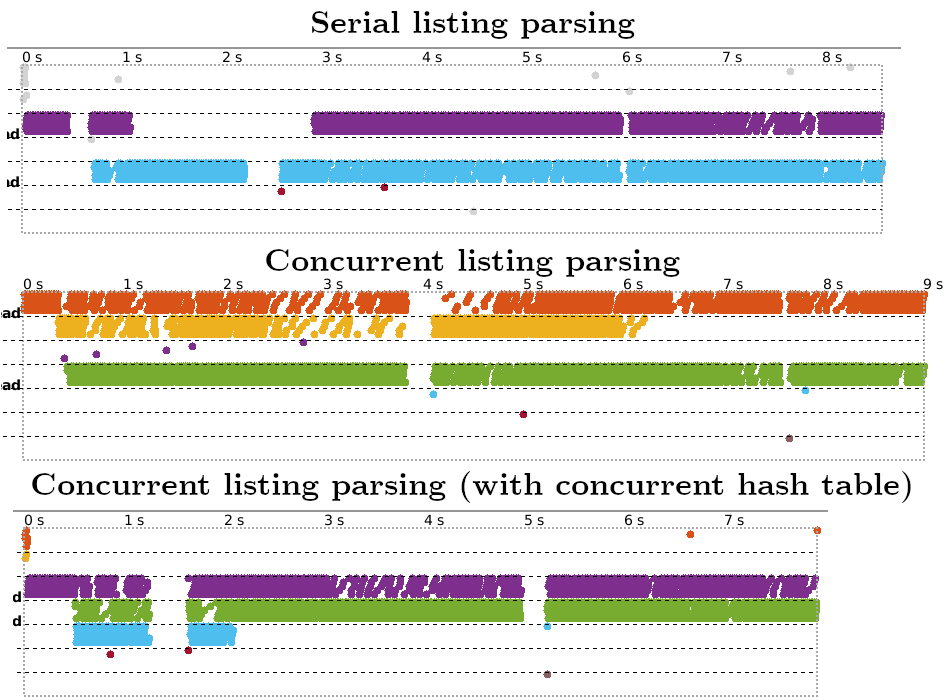A "portability" library for working with some implementations of concurrent hash tables, which do not have to be entirely locked in their operation.
Note that we have not thoroughly tested this library on every implementation, and in many scenarios. We are, however, fairly confident that it works on SBCL and Clozure Common Lisp.
This library was lifted from the decentralise2 utilities, as we found that contention between threads was limiting the throughput of the system. This new library, however, is licensed under the BSD two-clause license, and not the Cooperative Software License, as decentralise2 is.
This concurrent hash table has improved the performance of decentralise2, as it allows node information parsing to occur concurrently with other connections' activities. (We made these timelines using clim.flamegraph.)
(concurrent-hash-table:make-chash-table &key test hash-function segment-hash-function size &allow-other-keys)
Create a concurrent hash table.
:hash-function is a function, which is used somehow by the hash table
implementation to hash keys into fixnums.
:segment-hash-function is also a function that produces fixnums from keys,
but is used by segmenting hash tables to pick a segment for each key, and
thus should be faster and possibly less spread out.
It is expected that (funcall test k1 k2) implies
(= (funcall hash-function k1) (funcall hash-function k2)) (and similar for
the segment-hash-function.)
:size is the size of the concurrent hash table, defaulting to 1000.
:test is treated the same as it is with make-hash-table.
getchash, (setf getchash), remchash and mapchash work like their Common
Lisp counterparts.
Note that mapchash may provide stale values; use modchash in the
provided function if you need conditional updates.
(modchash key hash-table modification-function) atomically modifies a key-value
pair in a hash table, by calling the modification-function with its value and
t if the key is present, or some bogus value and nil if it is not. The
function then returns a new value and true if the key should be present, or
some bogus value and nil if the key should not. The modification function may
be called multiple times; generally when the concurrent hash table uses atomics
instead of locking.
(modify-value (key hash-table) (value present?) body ...) is a more
"imperative" sugaring over modchash.
(update-chash function hash-table) works in a similar way, but by calling the
function with every key and value in the table.
(do-concurrent-table (key value hash-table) body ...) is a more "imperative"
sugaring over update-chash.
You may want to run the benchmark to check if concurrent-hash-tables is right for you:
Testing Unsynchronised hash table, one thread:
Finished in 0.12 seconds
Testing Boxed hash table, one thread:
Finished in 0.18 seconds
Testing Boxed hash table, ten threads:
Finished in 0.73 seconds
Finished in 0.74 seconds
Finished in 0.74 seconds
Finished in 0.75 seconds
...
Testing Synchronised hash table, one thread:
Finished in 0.25 seconds
Testing Synchronised hash table, ten threads:
Finished in 1.13 seconds
Finished in 1.13 seconds
Finished in 1.13 seconds
Finished in 1.13 seconds
...
Testing Concurrent hash table, one thread:
Finished in 0.25 seconds
Testing Concurrent hash table, ten threads:
Finished in 0.09 seconds
Finished in 0.09 seconds
Finished in 0.09 seconds
Finished in 0.09 seconds
...(I'm not sure why a concurrent hash table is apparently faster than an unsynchronised table, and I'm too afraid to ask.)
Note that maintaining and retrieving the hash table count may cause some contention on implementations that we don't yet support atomic counting on (i.e. implementations that are not Clozure or SBCL); as we have to lock the hash table count to do so. This value should be locked for less time than a non-concurrent hash table, though, so we still believe it should improve throughput anyway.
